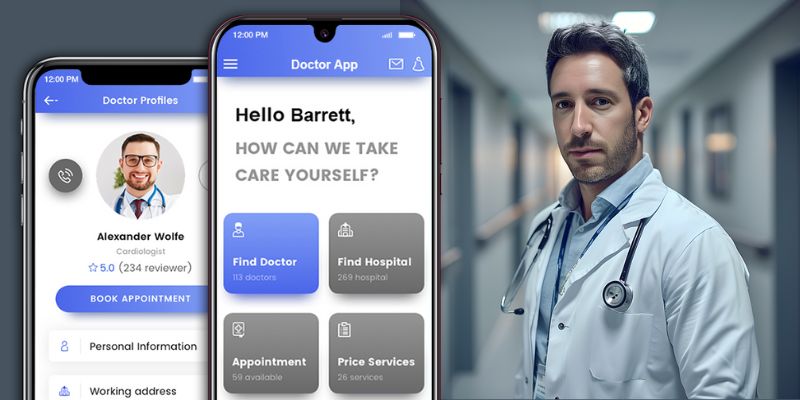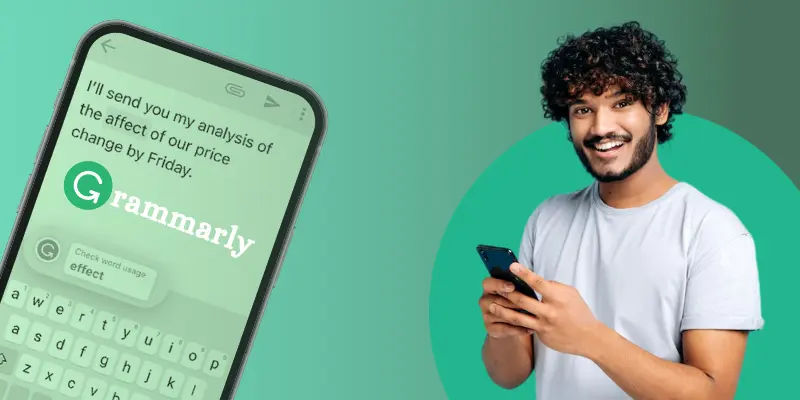What is a doctor appointment software?
Just think that you are struggling with a painful cramp suddenly in the middle of the night. Alternatively, you, as a user, can grab advantage of on-demand healthcare services or contact a medical professional from your house’s comfort. This way, you can get relieved from your health issue the same day, avoiding the half-hour drive to the physician’s clinic. Therefore, doctor appointment booking apps are the ultimate solution for customers and can be availed anytime around the clock.
The main objective of the software is to offer adequate medical amenitiies and prevent long waiting queues. Patients can book an appointment with a preferred healthcare expert in just a few clicks through their smartphones. Lately, there has been increased focus on the significance of immediate medical care. Care seekers and consumers look for anf buy trustworthy healthcare services just like they do other products and items. For this reason, if you plan to compete to produce a proficient on-demand healthcare services app, make sure you understand all about on-demand doctor app development from our tutorial.
1. Teladoc Health
Teladoc Health associates users with total care at their convenience and affordable prices. They can find anything they are looking for besides primary care, programs, and therapies that are provided to help users manage their overall health. It is an app to keep track of doctor appointments and is currently a leader in the telemedicine sector with over 50 million visitors. Highly professional doctors are available, and they can be accessed at any time alongside data-driven programs. If you require care in person, the app recommends in-network providers and locations for medical care. Teladoc health coaches will familiarise you with you. There are no time boundaries for their video and phone appointments. Instead of just 15 minutes, a user can end up spending a whole hour discussing health issues and strategizing future steps as a team.
Pros
-
Users can avail appointments 24*7.
-
Co-pay might be less expensive than face-to-face consultations.
-
Services are insurance-free.
Cons
-
Appointments can be costly when not covered under insurance.
-
There is no facility to follow up after a medical visit.
2. Amwell
Amwell is a well-known app for doctors appointment that allows consumers to board certified doctors at any hour of the day via a tablet, cellphone, or computer. Its safely running system enables you to consult a medical expert, psychiatrist, or therapist in the comfort of your home. The doctors can visualsie your condition while listening to you and figure out a suitable treatment course. Amwell provides cost-friendly services that prioritise health over money. If users are covered under health insurance, numerous prominent carriers include Amwell in their coverage. To confirm if your health insurance covers it, just input the insurance details to view the cost for the appointment. Amwell was recognised as the most famous telehealth platform from 2014 to 2016 by App Annie. Currently, it caters to millions of clients and has received initial accreditation from the American Telemedicine Association.
Pros
-
It is accessible around the clock every day of the week.
-
Treatments are available in various health areas.
-
Easily accessible through mobile or website.
-
Collaborate with several insurance firms.
Cons
-
Psychiatry is available only for adults.
-
Text-based therapy is unavailable.
-
No discounts are offered if a user becomes a part of both psychiatry and therapy.
-
It doesn't match you with a doctor automatically.
3. Doctor on Demand
Doctor on Demand aims to improve the availability of cost-effective healthcare, prioritizing the needs of the patient. This doctor appointment mobile app development service works on a united approach to online medical care by extending you the support of certified and experienced medical health experts. Users can enjoy the benefits of different services via any device. The platform treats a lot of common medical conditions, including cough/cold, flu, migraine, seasonal allergies, rashes/skin problems, chronic issues, and mental health issues. If a user is unsure about which service they want to seek, the app addresses that, too. It gives a free assessment that identifies depression symptoms before even signing up. This helps you comprehend the extent of distress you face on a regular basis.
Pros
-
The insurance covers all medical costs.
-
A user can select a professional based on expertise, field, and qualifications.
-
Mental health assistance is also available to kids.
-
Users can opt to work with a complete medical team, general physician, psychiatrist, and therapist to get treated according to the custom treatment plan.
Cons
-
Your options for therapists may be limited based on where you are located.
-
Obtaining a prescription for stimulants or benzodiazepines is not possible.
-
Without insurance, you may end up spending a higher amount on a 30-minute online therapy session compared to a 60-minute in-person therapy session.
4. Spruce
Spruce Health is an app for doctors appointment online, designed to follow HIPAA rules, that improves patient communication using audio, messaging, and video tools. It streamlines processes and securely transfers files, with additional features such as data analysis, call redirecting, rotation planning, and generating reports. A centralised email system assists in connecting healthcare providers with patients, handling patient requests, receiving voicemails, and sending customised replies. Developed both for medical care seekers and experts, Spruce transforms clinical operations and empowers them with simple-to-navigate tools for collaboration, business phone functionality, panel regulation, telehealth, and modernised tailored communications. Users are offered a free trial of 14 days without any payment. The best part is it aids clinics in patient involvement by sharing clinical questionnaires for input and follow-up.
Pros
-
Users can easily navigate through the interface.
-
Quick customer support assisting users with whatever help they need.
-
The fax service is effective and offers response, making it a dependable tool for users
-
The app is recognised for its adherence to HIPAA and for maintaining the confidentiality and safety of information.
Cons
-
The app has restricted features on the lower tier, and users need to pay extra to access them.
-
The number-porting process is time-consuming and might need to be corrected.
-
It does not provide hard copies of faxes for the uploaded documents, such as receipt proof, which makes record-keeping challenging.
-
Customer service can be unsatisfactory as only a robot is there for assistance, and guidance from a human takes time.
5. PlushCare
PlushCare is a doctor appointment app that provides urgent, primary, and mental health care appointments on the same day. It has extended roots around the globe, making it a reliable telemedicine platform to access, irrespective of location. Digital medical care and mental wellness services are offered in all 50 states of the US by top-quality, board-certified providers. The application includes a group of over 11 doctors who are committed to helping individuals lead healthier and happier lives. Therapy sessions with PlushCare cost $169, and there is an optional monthly membership fee of $16.99. It also accepts different types of insurance plans. Quest Diagnostics and LabCorp carry out tests on PLushCrae and host abundant screening processes.
Pros
-
Rates start from $5 for every test via Quest.
-
Patients can receive hundreds of diagnostic tests.
-
The app works with the majority of insurance providers.
Cons
-
To get lab tests done, users must go to a testing facility in their area.
-
Customers are not allowed to select to whom orders are sent.
-
Prices are determined by the type of test ordered.
-
Patients also report insurance and billing-related queries.
6. HealthTap
HealthTap is a doctor appointment booking application that offers continuous and reasonably-priced care under the guidance of dedcitaed and skilled medical professionals. Despite the fact that a user may or may not have insurance, HealthTap is a one-stop solution for customised healthcare requirements that saves money and time. In an effort to serve Americans with comprehensive healthcare, the top board-trained physicians in the United States focus on developing trustworthy connections with their patients. They are approachable for virtual telehealth visits seven days a week throughout all 50 states. Hence, the users can enjoy meeting the issue-specific doctors for daily checkups, treatment strategies, lab tests, and expert referrals.
Pros
-
Doctor consultations are free of cost while following up and seeking clarifications.
-
Users can get a 75% discount on prescriptions, if a local coupon is applied.
-
No extra cost is charged for creating kids’ profiles.
-
During off-timing, an instant available doctor will be allotted.
Cons
-
For the prime plan, insurance is not accepted.
-
Prescription costs are excluded.
-
Lab test facilities, referrals or prescriptions can be accessed by U.S. residents only.
7. Lemonaid
Lemonaid is your virtual personal physician. This is the ideal doctor appointment app for you if you are looking for cost-effective and easily attainable clinical services. Here, users can fill out a short quiz to get matched with a suitable doctor who can address their health and lifestyle concerns adequately. Unlimited calls and text messages can be made with the paired medical professional from any place at any time. They can prescribe medicines and arrange for delivery to your neighbourhood drugstore in a matter of minutes. Tests are offered to treat more than 30 health issues, such as mental wellness problems, diabetes, skin conditions, and more. It is accessible by residents in 50 states and Washington D.C. Certain subscription alternatives are available, like a $95 monthly cost for medical treatment connected to anxiety and depression, with a first-month discount.
Pros
-
Co-pays are affordable.
-
The app and website interface is intuitive.
-
Easy care from home options.
-
Prescriptions can be delivered to your doorstep or sent to a nearby chemist.
Cons
-
The app does not use insurance. Therefore, it can be challenging to get insurance to pay for medications.
-
If face-to-face consultations are missing, some issues might be uncovered.
-
Some health implications require in-person observation.
8. Zocdoc
Zocdoc is a doctor appointment app amidst the booming telemedicine marketplace, making it convenient for patients to seek and appoint suited medical experts. Every month, millions of clientele use the app to get assisted with in-network care and rapidly book appointments. After scheduling a time slot, patients usually see a doctor 24 to 72 hours later. The app’s objective is to guide each patient throughout the treatment process. There are approximately 10,000 healthcare providers in over 250 specialities, such as eye doctors, dentists, therapists, dermatologists, etc. It also involves emergency care service, imaging service, and 24/7 online assistance. +18,000 different insurance types are accepted by the providers on Zocdoc, making it simple to get in-network care. They also provide both virtual and in-person visits.
Pros
-
Options such as family therapy, couples therapy, and individual therapy are there.
-
Some online doctors are available for same-day appointments.
-
Users can filter providers catering to the insurance network.
Cons
-
Availability of providers is not always assured.
-
Acceptance of insurance differs per provider.
-
There is little guarantee that insurance will match an in-network provider.
9. MDLive
MDLive is a common purpose doctor appointment app for virtual physical and mental health treatment. It provides psychiatry and therapeutic offerings to users who are over 10 years old. The app offers behavioural appointments with authentic doctors and board-accredited psychiatrists along with dermatology services. You can either book an appointment at a convenient time or visit the doctor on-demand within a period of 15 minutes. The doctors here hold expertise of more than 15 years. Also, MDLive is approved officially by the American Telemedicine Association. In all US states and Puerto Rico, MDLive provides you with access to evidence-based therapy provided by licensed therapists. MDLive accepts a limited number of insurance policies and charges $108 for each session of treatment. You are able to buy multiple sessions as you like, and there are no monthly subscription fees.
Pros
-
If you are suffering from a hearing disorder, you can make use of live chat. It complies with the HIPAA Act.
-
A user can request an appointment anytime of the day.
-
Therapy-based appointments can be conducted via video conferencing or audio calls.
-
You are free to select the therapist or psychiatrist of your choice.
Cons
-
While an appointment can be booked flexibly, you might need to wait to talk to a doctor.
-
Availability of therapists can be limited so it can be challenging to schedule a weekend or evening appointment.
-
Doctors can prescribe stimulant drugs or benzodiazephines.
-
Disability documentation completion is not within the authority of mental health specialists.
10 Talkspace
Psychiatric services are currently offered to more than a million users of the app by dozens of counsellors and other psychological specialists. Anytime you need it, you can access the doctor appointment app and get assisted in the best way. Talkspace is available for use twenty-four hours a day. You can quickly and whenever you choose to change therapists, which adds to its agility. Users of Talkspace can also benefit from the security and convenience of safe mental health services. Talkspace is a user-friendly, fully secure web and mobile application. In addition to texting and participating in live video sessions, patients can send and receive video messages. It can be accessed with a subscription. American patients reported that they used Talkspace to cope with their mental health conditions during the epidemic and chose same-day home delivery.
Pros
-
The plans are flexible and start from a weekly cost of $69 on a monthly basis to access live programs and immediate messages.
-
It applies to some insurance plans where co-pays hold a value of $25 or less.
-
Text therapy can release the stigma of mental health care.
-
There is no need to commute as the app can be used on mobile or laptop.
Cons
-
The live sessions only last thirty minutes which may feel like restricted time to get all issues covered.
-
It has age restrictions, as it only allows counselling for teens aged between 13-17.
-
It does not provide financial assistance or a sliding scale.
-
It does not provide legal documentation for disability schemes.
Critical advantages of doctor appointment mobile app development
These applications offer a bundle of benefits, tailoring both to patients and doctors. Read through these:
-
Appointment management
These apps serve as a medium for seamless operation when scheduling appointments. By scheduling appointments at their convenience, patients can see their preferred healthcare professionals, cutting down on wait times and doing away with the need for phone conversations or in-person visits.
-
Effective patient engagement
A standard doctor appointment booking application hosts features such as notifications and alerts, helping patients remember the appointment time and date. This further reduces the tendency of no-shows. It is profitable both for patients who obtain prompt medical attention and healthcare professionals who are able to arrange their calendars smoothly.
-
Telemedicine integration
In past years, the telemedicine sector has tremendously evolved. Advanced appointment scheduling apps often leverage the telemedicine feature, facilitating remote video conversations or secure text consultations, including patients and doctors.
-
Personalised features for healthcare providers
A modern doctor appointment app that may be customized to meet the demands of a healthcare provider's practice is beneficial. This could involve invoicing and payment processing, analytics for performance improvement and monitoring, and linking to electronic health record (EHR) systems.
-
Patient reviews
Features that compile feedback from patients from previous experiences are a must for these apps. By gaining an understanding of a patient's degree of satisfaction, clinicians can identify areas for improvement and improve the quality of care.
-
Managing appointment waitlists
Amid busy healthcare settings, appointment waitlists are an adequate area for these apps to regulate. Care seekers can join waiting queues till they get the chance for their appointment with a provider. Also, doctors can determine no-show slots or cancelled appointments more efficiently.
-
Combining with wearable gadgets
Integrating with handy gadgets, like smartwatches or fitness trackers, helps monitor the health status of a person in real-time. The data can be synced all by itself via the doctor appointment app, supplying more information to medical professionals about the well-being and conduct of their patients.
Concluding Thoughts
Apps for doctor appointments are vital links between people and healthcare professionals in today's hectic world, providing convenience, effectiveness, and better access to care. These apps let patients take control of their health by speeding appointment scheduling, decreasing no-show rates, and merging telemedicine alternatives. Considering functionalities such as safe and authentic communication channels, personalised features, and health tracing, these apps not only contribute to high patient interaction but also lead to productive well-being outcomes. They mark an abrupt shift in the way healthcare is delivered, making it more patient- and provider-centered, individualized, and responsive to needs.













Share this blog